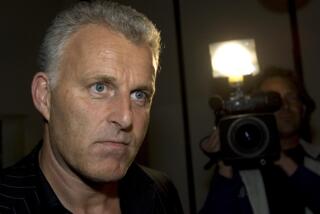Outspoken Dutch Film Director Slain
- Share via
AMSTERDAM — A suspected Muslim extremist Tuesday ambushed and killed an outspoken Dutch filmmaker who had received death threats because of his recent movie denouncing the abuse of women in Islamic societies, authorities said.
Writer-director Theo Van Gogh, a descendant of the artist Vincent Van Gogh, was attacked shortly before 9 a.m. as he rode his bicycle through Amsterdam’s tree-lined streets toward the offices of his production company. Another cyclist, described as bearded and wearing Islamic-style clothes, pulled up behind him and opened fire, police said.
For the record:
12:00 a.m. Nov. 11, 2004 For The Record
Los Angeles Times Thursday November 11, 2004 Home Edition Main News Part A Page 2 National Desk 0 inches; 31 words Type of Material: Correction
Filmmaker’s slaying -- An article in Section A on Nov. 3 about the slaying of Dutch filmmaker Theo van Gogh gave the name of Dutch newspaper NRC Handelsblad as NRC Handelsblatt.
Van Gogh dropped his bike and stumbled away, and the gunman gave chase, shot him again and stabbed him, police said. Police cornered the suspect in a nearby park and a gunfight ensued. The suspect was wounded in the leg, and an officer was slightly injured, authorities said. The suspect was arrested.
The suspect’s name was not released, but law enforcement officials said they knew the Moroccan Dutch 26-year-old for his ties to alleged Muslim extremists and that he had a criminal record. Authorities gave no details of that record. Police said they found a document that the killer left attached to a knife he used to stab the victim.
The document is believed to be the killer’s will, a sign that he planned to die in the attack, which apparently was driven by religious extremism, a law enforcement official said.
“This suspect was at least known to the authorities. He was known as a Muslim activist,” said the official, who asked not to be identified. “He had indirect contacts with people under investigation for Islamic extremism.”
Thousands gathered Tuesday night for a memorial rally called by Amsterdam’s mayor, an event that was accompanied by loud drummers, as the rowdy Van Gogh would have wanted.
For many Dutch, the slaying revived painful memories of the 2002 assassination of maverick political leader Pym Fortuyn, another sensational crime that mixed Islam and Dutch politics.
A feminist politician who starred in Van Gogh’s film accused authorities of failing to prevent a crime foretold.
Congressional deputy Ayaan Hirsi Ali has lived with round-the-clock bodyguards for several years because of threats arising from her campaign against abuse of women in Muslim immigrant communities. Van Gogh had been inundated with threats since the airing of his film “Submission” in August, said Ali, a former Somali refugee.
“Everyone knew that this could happen,” Ali told the NRC Handelsblatt newspaper Tuesday. “He’s been threatened almost constantly since the summer. I know how the Arabic culture of revenge works. I’ve had security around me, so Theo was the easiest target.
“It’s incredibly stupid that the local authorities in Amsterdam didn’t protect Van Gogh,” she added. “ ... It makes me cynical. Apparently in this country, the habit is to wait until someone dies before taking action.”
Van Gogh, a chain smoker with a defiant, irascible style, had dismissed the dangers during a radio interview last week.
“If it happens, it happens,” he said, then added: “The bullet won’t come for me. People think, ‘He’s the village idiot, so why would I shoot him?’ ”
Police had looked into the threats against Van Gogh but decided they were not concrete enough to assign him guards, a Dutch prosecutor told journalists Tuesday.
Dutch Prime Minister Jan Peter Balkenende issued a written statement asking the public not to jump to conclusions.
“The facts have to be carefully examined,” he said. “Let’s allow the investigators to do their jobs. Van Gogh was someone who took part in the public debate with outspoken opinions, a champion of free speech. It’s unacceptable if expressing a free opinion was the reason behind this brutal murder.”
The crime was the latest sign of problems in the Netherlands. It has a low crime rate but is an increasingly troubled society -- struggling, for example, to integrate Muslim immigrants.
Fortuyn’s slaying forced the Dutch to confront complex issues about free speech, tolerance and discrimination. In fact, Van Gogh was completing work on a documentary about the Fortuyn assassination that was to be released in January.
Fortuyn was killed by an animal-rights activist who said he was angry about the populist, openly gay politician’s ideas on immigration and Islam. Fortuyn had stirred up passions with his warnings that the Netherlands had to work harder to integrate Muslims whose culture discriminated against women and gays. Fortuyn’s rivals accused him of xenophobia against Muslim immigrants.
Van Gogh’s hard-edged rhetoric drew the same kind of criticism. He shared Fortuyn’s typically Dutch mix of social liberalism and political conservatism, commentators said. Van Gogh admired President Bush and his self-declared “war on terrorism,” said Emerson Vermaat, a Dutch investigative journalist writing a book on Al Qaeda in Europe.
Some Muslim activists called Van Gogh’s film blasphemous. The 10-minute short tells the fictional stories of four women who endure incest, rape, beatings and forced marriages.
It features images of women with Koranic verses painted on their bodies under see-through chadors.
More to Read
Sign up for Essential California
The most important California stories and recommendations in your inbox every morning.
You may occasionally receive promotional content from the Los Angeles Times.













